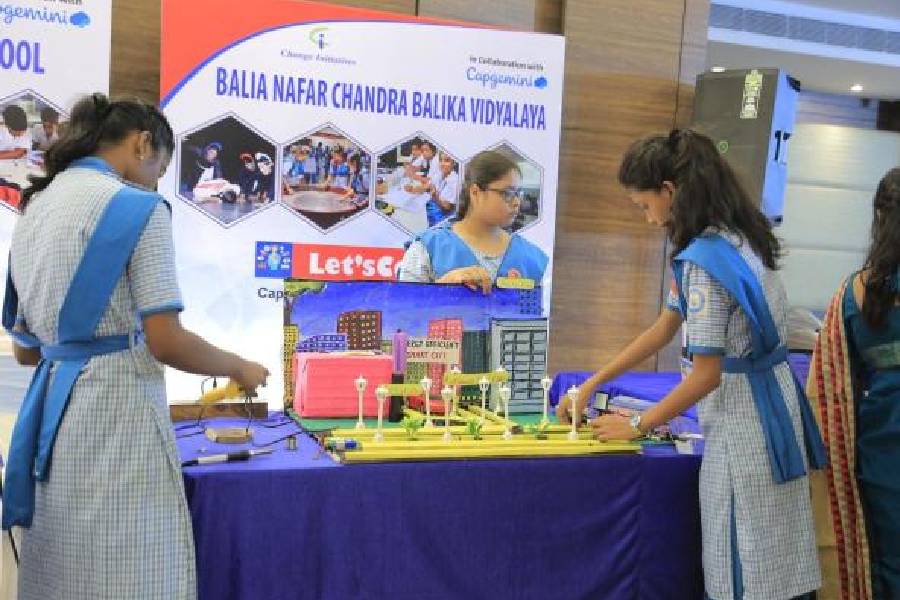An educative yet enjoyable meet for students was held at The Stadel where they exhibited models created in coding labs and also attended panel discussions by experts of the field.
This was the second annual government-aided school meet organised by NGO Change Initiative, in association with Capgemini. “We have been working with rural communities on communication technology for development since 2002, when people had little understanding of computers,” said Jhumpa Ghosh, director of Change Initiative and a resident of GC Block. “As computer-aided learning became a part of school curriculums, we realised students in Bengali-medium schools in rural areas, who lack access to advanced technology, should also have these opportunities. We started this project and short-listed 10 schools out of 17 in the Sonarpur education circle to launch the ‘Let’s Code’ project.”
Smart exhibits
“I want to become a scientist and invent gadgets that will benefit society,” said Mainak Biswas, a Class IX student of AD Block’s Laban Hrad Vidyapith, impressed after watching a presentation on the IoT Dashboard using sensors to measure temperature, altitude, and humidity.
Anish Pal of the same school was curious about an automatic school attendance system model and Riddhi Payra thought of developing a smartwatch that could detect missing persons. “I’m inspired by the model of a smart medicine box made by students of another school. It uses light and sound to remind patients to take specific medicines. There is also a smart helmet for accident detection.”
Students of the AD Block school were accompanied by mathematics and geography teachers Satyajit Saha and Tanmoy Mitra. “Our students are not just impressed by the models exhibited here but also shared ideas on how these could be made more effective using gadgets or circuits. They want to exhibit their own models at next year’s meet,” said Saha.
Mitra added that they have had initial discussions with Change Initiative regarding a digital literacy programme. “They might provide teaching faculty for coding classes on our campus,” he said.
Bridging digital divide
A discussion on the impact of artificial intelligence had Sayantani Roy, associate professor at Praxis Business School, highlight the pros and cons of AI in academia. “AI has benefited students in many ways but it can also create a digital divide. Consider how many students from remote areas dropped out of school during the lockdown as they did not have access to online classes,” she said, adding that along with coding, lessons in prompt engineering would benefit new-generation learners. Their institute has introduced generative AI as a compulsory paper in the MBA curriculum from July 2024 to meet market demands.
Kuntal Ghosh, associate professor at ISI, asked students to build a strong foundation. “Since data science and coding are rooted in logical reasoning, a strong foundation in basic science will lead to a better understanding of coding,” he said.
Saptarsha Sarkar, product lead in Capital A Blockchain Technology asked students to develop critical and creative thinking. “Change the basic pedagogy of AI from ‘how’ to ‘why’ to leverage your thinking skills better. Basic education should be more application-oriented and exam questions should encourage independent thinking,” he said.
Another discussion was on coding tinkering for all and sustainability. “Curiosity is innate in children and schools should create opportunities to nurture this. Teachers must sustain students’ interest in these labs to ensure their growth and success,” said Y. Suresh Reddy, director of SRF Foundation. Coding & Tinkering Lab Mentor Soumajit Das shared, “Initially, students could barely turn on a computer—only a few could paint or write. Even getting them to attend classes was challenging. But after a few months, as I introduced Scratch, Python, and the Turtle library, they became interested and started asking questions. Previously, these students played mobile games, but now they search for relevant information and discuss their findings in the next class, questioning why a code is not running, for instance.”










